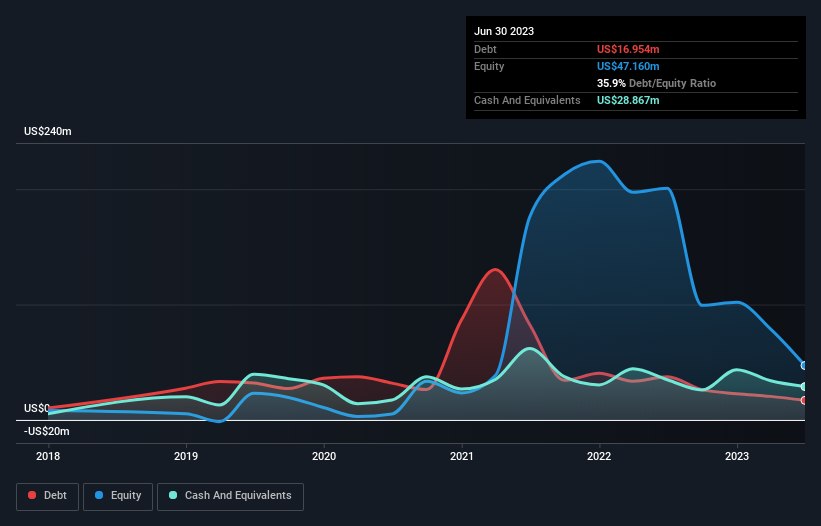- United States
- /
- Consumer Durables
- /
- NasdaqCM:ATER
Does Aterian (NASDAQ:ATER) Have A Healthy Balance Sheet?
The external fund manager backed by Berkshire Hathaway's Charlie Munger, Li Lu, makes no bones about it when he says 'The biggest investment risk is not the volatility of prices, but whether you will suffer a permanent loss of capital.' So it seems the smart money knows that debt - which is usually involved in bankruptcies - is a very important factor, when you assess how risky a company is. As with many other companies Aterian, Inc. (NASDAQ:ATER) makes use of debt. But should shareholders be worried about its use of debt?
Why Does Debt Bring Risk?
Generally speaking, debt only becomes a real problem when a company can't easily pay it off, either by raising capital or with its own cash flow. Ultimately, if the company can't fulfill its legal obligations to repay debt, shareholders could walk away with nothing. While that is not too common, we often do see indebted companies permanently diluting shareholders because lenders force them to raise capital at a distressed price. Having said that, the most common situation is where a company manages its debt reasonably well - and to its own advantage. The first step when considering a company's debt levels is to consider its cash and debt together.
View our latest analysis for Aterian
How Much Debt Does Aterian Carry?
You can click the graphic below for the historical numbers, but it shows that Aterian had US$17.0m of debt in June 2023, down from US$37.4m, one year before. But it also has US$28.9m in cash to offset that, meaning it has US$11.9m net cash.

A Look At Aterian's Liabilities
We can see from the most recent balance sheet that Aterian had liabilities of US$40.8m falling due within a year, and liabilities of US$1.56m due beyond that. Offsetting these obligations, it had cash of US$28.9m as well as receivables valued at US$4.78m due within 12 months. So it has liabilities totalling US$8.66m more than its cash and near-term receivables, combined.
While this might seem like a lot, it is not so bad since Aterian has a market capitalization of US$28.5m, and so it could probably strengthen its balance sheet by raising capital if it needed to. But it's clear that we should definitely closely examine whether it can manage its debt without dilution. Despite its noteworthy liabilities, Aterian boasts net cash, so it's fair to say it does not have a heavy debt load! There's no doubt that we learn most about debt from the balance sheet. But it is future earnings, more than anything, that will determine Aterian's ability to maintain a healthy balance sheet going forward. So if you're focused on the future you can check out this free report showing analyst profit forecasts.
In the last year Aterian had a loss before interest and tax, and actually shrunk its revenue by 17%, to US$191m. We would much prefer see growth.
So How Risky Is Aterian?
Statistically speaking companies that lose money are riskier than those that make money. And we do note that Aterian had an earnings before interest and tax (EBIT) loss, over the last year. Indeed, in that time it burnt through US$4.4m of cash and made a loss of US$198m. With only US$11.9m on the balance sheet, it would appear that its going to need to raise capital again soon. Summing up, we're a little skeptical of this one, as it seems fairly risky in the absence of free cashflow. When analysing debt levels, the balance sheet is the obvious place to start. However, not all investment risk resides within the balance sheet - far from it. Be aware that Aterian is showing 3 warning signs in our investment analysis , and 1 of those is a bit unpleasant...
At the end of the day, it's often better to focus on companies that are free from net debt. You can access our special list of such companies (all with a track record of profit growth). It's free.
New: Manage All Your Stock Portfolios in One Place
We've created the ultimate portfolio companion for stock investors, and it's free.
• Connect an unlimited number of Portfolios and see your total in one currency
• Be alerted to new Warning Signs or Risks via email or mobile
• Track the Fair Value of your stocks
Have feedback on this article? Concerned about the content? Get in touch with us directly. Alternatively, email editorial-team (at) simplywallst.com.
This article by Simply Wall St is general in nature. We provide commentary based on historical data and analyst forecasts only using an unbiased methodology and our articles are not intended to be financial advice. It does not constitute a recommendation to buy or sell any stock, and does not take account of your objectives, or your financial situation. We aim to bring you long-term focused analysis driven by fundamental data. Note that our analysis may not factor in the latest price-sensitive company announcements or qualitative material. Simply Wall St has no position in any stocks mentioned.
About NasdaqCM:ATER
Aterian
Operates as a technology-enabled consumer products company in North America, Chile, Colombia, Argentina, and internationally.
Adequate balance sheet and fair value.
Similar Companies
Market Insights
Community Narratives



